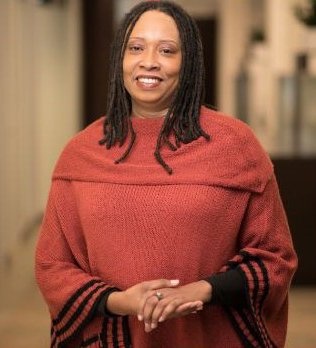Columbia College | Columbia University in the City of New York
Take Five with Alethia Jones ’91

What were you like when you arrived at Columbia?
I was recovering from an undiagnosed case of culture shock. I’m an immigrant from Kingston, Jamaica, and after two years in New York City public schools, I won a full scholarship to an elite New England boarding school. I had spent my high school years “embedded” in WASP privilege with no mentors or guidebook, immersed in truly foreign social norms. Returning to NYC was part of my “recovery” — it was a chance to be closer to my family, who lived in Brooklyn, but I also sought solace in the complex plurality of the city, and of Harlem. I wanted the Core Curriculum to explain to me this strange world I had been thrust into. I needed to understand the roots of this thing known as Western Culture and Civilization.
What do you remember about your first-year living situation?
First, attending the dorm orientation on our first night and being told that it was dangerous to go to Harlem and not to venture to 125th Street! Some of the black first-years quickly organized a trip to Harlem and we became regular patrons of Mart125 (now defunct) and other destinations. Harlem’s vibrancy and culture made us feel at home. Second, I remember seeing my roommate’s check for the full tuition, which represented a third of my mom’s annual salary. It was the first time I saw a check for so much money. Finally, I remember a floormate (another full-pay student) bragging about his 4.0 GPA. I was proud of those of us who held part-time jobs, in addition to having a work study job and engaging in extracurricular activities, all while sustaining a 3.3–3.7 GPA.
What class do you most remember and why?
The best class was the one I never enrolled in. Phil Thompson taught an urban studies seminar at Barnard the year before he officially joined the faculty. All my friends raved about the class and the fact that he provided internships to anyone who wanted one. David Dinkins was mayor and Phil ran his Office of Housing Coordination. I started sitting in on Phil’s classes and requested and received a yearlong internship in the Mayor’s Office of Education Services, where I conducted research for my senior thesis. That experience influenced me to become a Coro Fellow in Public Affairs and deeply prepared me for the rigors of independent research. Phil and I were reunited when he became a visiting professor at Yale. He recruited me to MIT, where we co-taught a graduate seminar on immigrants and cities. In a crazy coincidence, almost 30 years later, I found myself being interviewed by my former internship supervisor when her consulting firm was hired to conduct a strategic assessment of an organization on whose board I served. Phil is now deputy mayor for Bill DeBlasio and remains a mentor and friend.
Did you have a favorite spot on campus, and what did you like about it?
I like underbellies. One of my on-campus jobs was in a building services department in the basement of East Campus. I worked the graveyard shift on weekends fielding calls from tenants experiencing lack of heat from busted plumbing and other maintenance needs. I would dispatch the mechanic on call. I like knowing the “bowels” of institutions firsthand, and it was sobering to be a part of Columbia’s real estate empire from that vantage point. But I also love Butler Library and the Quad. The architecture is so majestic and imposing.
What, if anything, about your College experience would you do over?
Go into (even more) student loan debt to study abroad in Africa. I was an anthropology major but it was very difficult and expensive to study abroad as a financial aid recipient at that time. I adapted by becoming an urban studies major, which allowed me to study colonial dynamics and cultural contact in cities of the Global North, including New York City. I would also take a ton more dance classes in Harlem and become fluent in Spanish.
More “Take Five”
- 1 of 31
- ›

